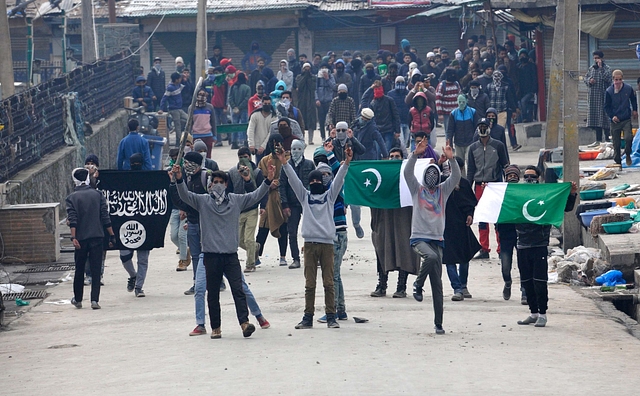
India, The Modern Nation State, Finds Itself Fighting A Medieval War
India does not exist only to fight Pakistani jihadis. But Pakistani jihadis exist for the lone purpose of fighting India.
Jihadis have the comfort of paradise. Modern states have the burden of tomorrow.
You can also read this article in Hindi- एक आधुनिक राष्ट्र भारत, एक मध्ययुग के युद्ध में फँसा है
What if, in the wake of the attack in Pulwama, India carries out retaliatory strikes inside Pakistan or liquidates Masood Azhar, the Jaish-e-Mohammed chief? The risk in this step is the inevitable retaliation by the jihadi groups. India’s intelligence and security agencies will, of course, be prepared, but what if out of hundreds dispatched, even one jihadi comes through and executes his plan?
In a fight against Pakistan, the obvious fact that India has to consider and weigh such options becomes a handicap for it. Simply because, the other side is free of spending its time and efforts on such deliberations.
India does not exist only to fight Pakistani jihadis. But Pakistani jihadis exist for the lone purpose of fighting India. In any conflict, India would have to consider all possible options from all possible angles. The potential losses have to be factored in because if they do happen, a state like India would have to deal with them and bear them. However, in jihad, there is no loss. When alive, a jihadi is on path to paradise. When dead, he is a hero who has attained it. So, while India would have to worry about the effects of its actions on tomorrow, jihadis have no tomorrow. They have ‘heaven’ instead.
But surely they too must worry about retaliation from India and the lives of their people, you may ask. Yes, logic dictates that they should. But then, why hasn’t that stopped them from going from one brazen attack to another, you may ask further. Here, one would suppose, India has, even though inadvertently, and up till recently, helped them with what is generously described as strategic restraint. Up till recently, India hadn’t demonstrated that it can inflict costs against every of act of terror by jihadis from Pakistan. And so, why would anyone making decisions factor in a cost which he knows he will not incur?
The larger point here is this. While India sees its conflict with Pakistan as a fight between two modern states, Pakistan sees it as a religious war which it is bound to carry out by sacred duty. There is an asymmetry in the approach of both the countries to their mutual conflict, and it is severely harming India. Pakistan is one of the many problems of the Indian state. But for Pakistan, the defeat of India is an end which it has to pursue in deference to the historic project of a civilisation—Islamic. India constructs, or tries to construct, its Pakistan policy around the principles of security and strategic interests. Pakistan though, executes its India policy in accordance to what it sees as its divinely ordained purpose.
But behind the banner of religion, lies the fear of a loss of identity. An identity, which was always tenuous; of a nation, which has been called, and has always been, ‘insufficiently imagined’.
Pakistan (or at least those who run it) needs to be in a perpetual conflict with India because it needs to constantly justify its existence to itself. Imagine what would be the implications of India and Pakistan being cordial neighbouring states. If that happens, then sooner or later this question is bound to come up that if India and Pakistan can co-exist peacefully, does that mean that perhaps Hindus and Muslims can live together peacefully, too? And if Hindus and Muslims can live together peacefully, then why did the subcontinent ever need a separate state for Muslims? What then, is the need for Pakistan?
Conflict with India is thus the nourishment which the Pakistani state provides to the definition of its own identity.
Up till now, Kashmir has been providing Pakistan the chance to position itself as anti-India. But if not Kashmir, the Pakistani leadership would have chosen any other region of India to stake claim to, and start an armed conflict for; because if not actively anti-India, what is Pakistan?
India is free of the fear of such existential crises, but it has suffered unacceptable losses due to that of its western neighbour.
The question then is, how does India secure itself against a state which religiously — literally religiously — seeks to damage and even destroy India? India can win wars, impose sanctions, abrogate treaties, eliminate jihadi leaders, but none of that would guarantee permanent peace and security. For, the anti-India ideology in Pakistan would remain. And this would get new adherents, and then some more, and then some, and then. . .
There appear to be only two scenarios which promise lasting peace and security for India.
One, Pakistan Balkanises under the strain of secessionist movements in Balochistan and Sindh and following that, the residual, far weaker, ‘Punjab Pakistan’ state is forced to divert its energies away from India.
Two, in an inspired process of self-realisation, Pakistan imagines a new identity for itself, one which does not necessitate it being in constant conflict with India.
The probability of either of these scenarios coming true in the near future is only that much above zero.
For this reason, it’s a very, very long war ahead for India. A war, where although India would have to make its choices like a responsible state of the twenty-first century, its enemies would have it far easier. They’d only be choosing between what they would believe to be heaven, and the road to it.